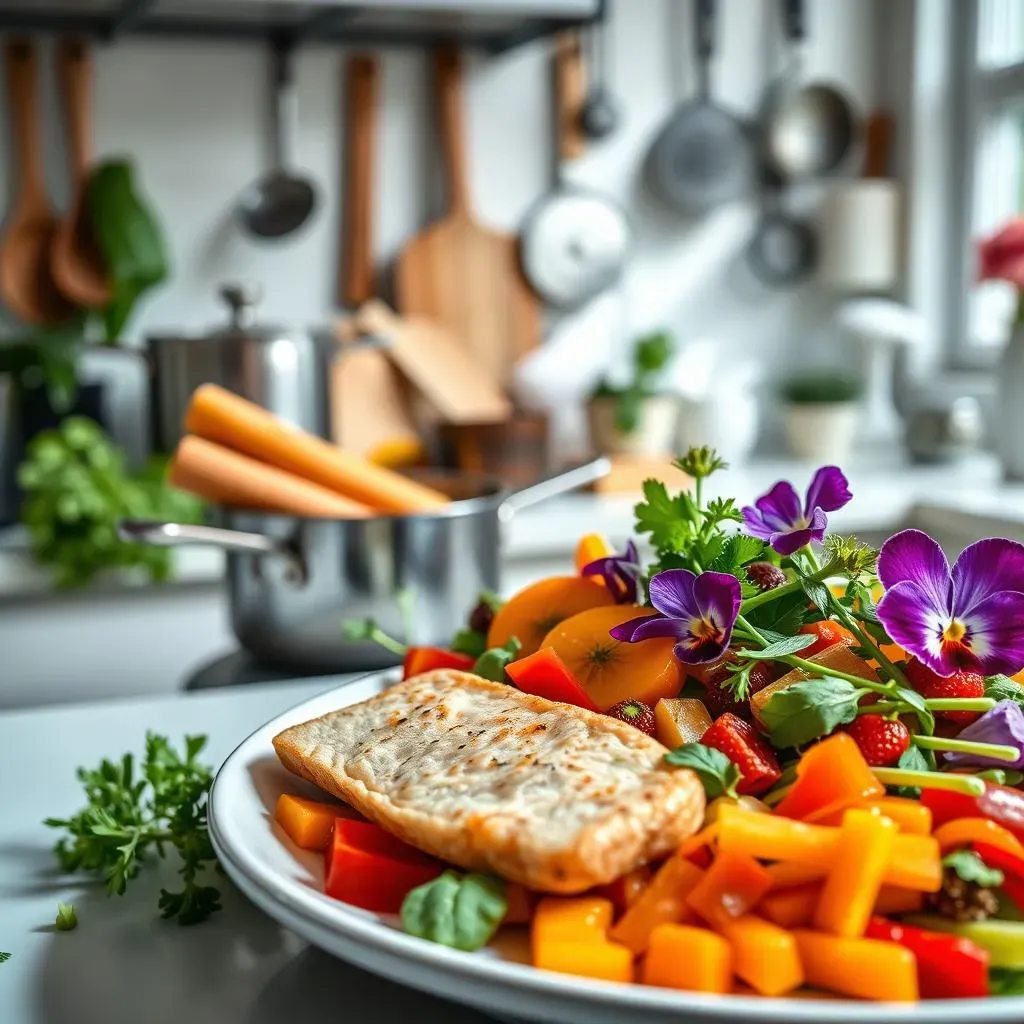Table of Contents
We've all been there, staring into the fridge at 7 PM, wondering, "What's for dinner?". But have you ever stopped to ask, "Is dinner healthy?". It's a question that goes beyond just what's on your plate. This article isn't about strict diets or complicated recipes. Instead, we're going to explore the real impact of your evening meal on your well-being. We'll tackle the big questions: Does the timing of your dinner matter? What ingredients make a meal genuinely nutritious? And how can you make healthy eating a simple part of your daily routine? It’s time to move past the myths and get to the heart of what a healthy dinner truly means for you. You'll find that creating balanced, satisfying meals is easier than you might think, and it’s a key part of a healthy lifestyle. So, let’s get started and discover how to make dinner not just a meal, but a step towards better health.
The Truth About Dinner: Is it Really That Important?

The Truth About Dinner: Is it Really That Important?
The Dinner Dilemma: More Than Just Fuel
So, let's talk about dinner. We often think of it as just another meal, a pit stop in our day. But is it really just that? I'd argue no. Dinner is the last chance we have to nourish our bodies before a long period of rest. It’s not just about filling our stomachs; it's about setting the stage for a good night's sleep and how we feel the next day. Think of it like this: if you're going to bed with a tank full of junk, you can't expect your engine to run smoothly the next morning. But, if you're filling up with the right stuff, it's like giving your body the premium fuel it needs to recharge.
It's easy to fall into the trap of grabbing whatever's convenient, especially after a long day. But, we need to start thinking about dinner as an opportunity to boost our health. It's not about perfection, it's about making mindful choices that support our overall well-being. After all, it's not just about surviving; it's about thriving.
The Impact of Evening Eating Habits
Now, I know what you might be thinking: "It's just dinner, how much can it really matter?" Well, quite a bit, actually. What you eat for dinner can affect everything from your sleep quality to your weight and even your mood the next day. A heavy, greasy meal before bed? You might be tossing and turning all night, feeling sluggish in the morning. A light, balanced meal, on the other hand, can help you drift off peacefully and wake up feeling refreshed. It's not just about calories either, it's about the types of food we're putting into our bodies. Are we choosing nutrient-rich options or just empty calories?
Consider this: Dinner is often the largest meal of the day for many people. This means it’s a prime opportunity to load up on those essential vitamins, minerals, and fiber. So, it's more than just 'is dinner healthy'; it's about how we use this final meal of the day to our advantage. It's about choosing foods that fuel us, not just fill us up.
Aspect | Impact of Unhealthy Dinner | Impact of Healthy Dinner |
|---|---|---|
Sleep | Restless sleep, difficulty falling asleep | Improved sleep quality, easier to fall asleep |
Energy Levels | Morning sluggishness, low energy | Increased energy, feeling refreshed |
Weight | Potential weight gain, poor metabolism | Weight management, improved metabolism |
Mood | Irritability, mood swings | More stable mood, better focus |
Reframing Our View of Dinner
So, if dinner is so important, why do we treat it like an afterthought? I think it's because we're often tired, stressed, and just want something quick and easy. But what if we started to see dinner as a chance to be kind to our bodies? What if we reframed it as a moment to nourish ourselves with intention? It doesn't have to be complicated or time-consuming. It's about making small, consistent changes that add up to a big impact.
Think about it: dinner is not just something we *have* to do; it’s a chance to do something good for ourselves. It's a chance to support our health, our energy, and our overall well-being. So, the next time you're thinking about dinner, ask yourself not just "what am I going to eat?", but "how can I make this meal work for me?". It's a shift in perspective that can make all the difference.
Making Dinner Healthy: Key Ingredients and Cooking Methods

Making Dinner Healthy: Key Ingredients and Cooking Methods
Okay, so we've established that dinner isn't just a throwaway meal. Now, let's get into the nitty-gritty: how do we actually *make* dinner healthy? It's not about being a gourmet chef, I promise. It's all about understanding some key ingredients and how to cook them in a way that keeps the good stuff in and the bad stuff out. Think of your kitchen as a laboratory, and you're the scientist experimenting with flavors and nutrients. The goal? To create a delicious concoction that's also incredibly good for you.
First off, let's talk about the building blocks of a healthy meal. We're aiming for a balance of protein, complex carbohydrates, and healthy fats. Protein is essential for muscle repair and keeping you full, so think lean meats, fish, beans, or lentils. Complex carbs like brown rice, quinoa, or sweet potatoes provide sustained energy without the sugar crash. And don't be shy about healthy fats from avocados, nuts, seeds, and olive oil. These are crucial for brain function and overall health. It's like assembling a puzzle; each piece is important and contributes to the bigger picture.
Key Ingredient | Why It's Healthy | Examples |
|---|---|---|
Lean Protein | Muscle repair, keeps you full | Chicken breast, fish, tofu, beans |
Complex Carbs | Sustained energy, fiber | Brown rice, quinoa, sweet potatoes |
Healthy Fats | Brain function, nutrient absorption | Avocado, nuts, olive oil |
Now, let's move onto cooking methods. How you cook your food can make a huge difference. Grilling, baking, and steaming are all great ways to prepare meals without adding a ton of extra fats. Avoid deep-frying or using excessive amounts of oil, as they can turn a healthy meal into a calorie bomb. When you're roasting vegetables, for example, a little olive oil and some herbs can bring out their natural sweetness and flavors without drowning them in fat. It's all about enhancing the good stuff without adding unnecessary extras.
And don't forget about the importance of vegetables! Try to incorporate a variety of colorful veggies into your dinners. Each color group offers different vitamins and minerals, so think of your plate as a rainbow. Experiment with different herbs and spices to add flavor without relying on salt or unhealthy sauces. It's amazing how a little garlic, ginger, or cumin can transform a simple dish. Remember, cooking healthy doesn't have to be boring; it's about getting creative and having fun in the kitchen.
- Grilling: Great for meats and vegetables, adds flavor without extra fat.
- Baking: A versatile method for cooking almost anything, from fish to potatoes.
- Steaming: Preserves nutrients and keeps food light and healthy.
- Roasting: Enhances the natural flavors of vegetables with minimal oil.
Is a Late Dinner Bad? Timing Your Meal for Better Health

Is a Late Dinner Bad? Timing Your Meal for Better Health
Okay, so we’ve nailed the "what" and the "how" of healthy dinners. But what about the "when?" Does it really matter if you eat at 6 PM or 10 PM? The short answer is: yes, it can. Our bodies have this internal clock, a circadian rhythm, that regulates all sorts of things, including digestion. Eating late at night can throw this clock out of whack, leading to some not-so-fun consequences. Think of it like trying to run a marathon right before you go to bed; your body isn't designed for that kind of activity at that time. It’s meant to be winding down, not revving up to digest a huge meal.
When you eat late, your body doesn't have as much time to properly digest the food before you go to sleep. This can lead to indigestion, heartburn, and a restless night. Plus, your metabolism slows down while you sleep, so those late-night calories are more likely to be stored as fat. It's like trying to fill a bucket with a hole in the bottom; you're putting in effort, but it's not very efficient. It's not about being rigid with a specific time, but more about being mindful of giving your body enough time to process your meal before you hit the hay.
Timing | Potential Impact |
|---|---|
Early Dinner (e.g., 6-7 PM) | Better digestion, improved sleep, efficient metabolism |
Late Dinner (e.g., 9-10 PM or later) | Indigestion, poor sleep, potential weight gain |
I'm not saying you need to eat dinner at the same time every single night. Life happens, and sometimes you're just going to have to eat later than you'd like. But, if you can, try to aim for at least 2-3 hours between your last meal and bedtime. This gives your body a chance to digest properly and reduces the likelihood of sleep disturbances. It’s not about perfection, it’s about finding a balance that works for you. Think of it as giving your body the space and time it needs to do its job effectively.
Also, the type of food you eat late at night is crucial. Avoid heavy, greasy, or sugary meals close to bedtime. These can cause blood sugar spikes and crashes, making it difficult to fall asleep and stay asleep. Instead, opt for a light, easily digestible meal if you must eat late. A small bowl of soup, some yogurt with fruit, or a handful of nuts are all good options. It's about making smart choices that support your body's natural rhythms and promote a good night's rest. After all, a well-rested body is a healthy body.
- Aim for 2-3 hours between dinner and bedtime
- Avoid heavy meals late at night
- Choose light, easily digestible options if you must eat late
Practical Tips for Planning Healthy and Easy Dinners

Practical Tips for Planning Healthy and Easy Dinners
Embrace the Power of Meal Planning
Alright, let's talk strategy. We’ve covered why healthy dinners matter and what makes them tick. Now, how do we actually make it happen? The secret weapon here is meal planning. I know, I know, it sounds boring, but trust me, it's a game-changer. Think of it like setting a course for the week, instead of just wandering aimlessly into the kitchen each evening. It doesn't have to be a rigid, color-coded spreadsheet. It can be as simple as picking out a few recipes you like and making a list of ingredients. The goal is to take the guesswork out of dinner and make it feel less overwhelming. It's like having a map for your culinary journey, so you don't get lost in the land of takeout menus.
Start small, maybe just plan for three dinners a week. Choose recipes that are quick and easy, and that use similar ingredients to minimize waste. Look for recipes that can be made in one pot or pan to cut down on cleanup time. This approach takes the stress out of figuring out what's for dinner each night. Plus, it also helps you avoid those last-minute, unhealthy decisions. It's not about being perfect, it's about making your life a little easier and a whole lot healthier. Think of it as a little investment in your future self, who will thank you for not having to stress about dinner at 7 pm.
Stocking Your Kitchen for Success
Okay, so you've got your meal plan. Now, let's make sure your kitchen is set up for success. This means stocking it with the right ingredients. Think of it like having the right tools for a job; you can't build a house without a hammer and nails, and you can't make healthy dinners without the right ingredients. Keep your pantry stocked with staples like whole grains, canned beans, lentils, and healthy oils. Fill your fridge with fresh vegetables, fruits, and lean proteins. Having these essentials on hand makes it so much easier to throw together a healthy meal, even on a busy weeknight. It’s like having a superhero’s utility belt, always ready for action.
Don't be afraid to use frozen vegetables and fruits. They are just as nutritious as fresh ones and can be a huge time-saver. Also, consider prepping some ingredients ahead of time. Chop your vegetables, cook your grains, or marinate your proteins. This makes it so much easier to get dinner on the table quickly. It's like having a pit crew ready to go for your meal prep. It’s not about spending hours in the kitchen; it's about working smarter, not harder. The goal is to make healthy eating feel as effortless as possible, so you are more likely to stick with it.
Pantry Staples | Fridge Essentials | Freezer Must-Haves |
|---|---|---|
Whole grains (quinoa, brown rice) | Fresh vegetables (broccoli, spinach) | Frozen vegetables (peas, carrots) |
Canned beans and lentils | Lean proteins (chicken, fish) | Frozen fruits (berries, mango) |
Healthy oils (olive, avocado) | Fruits (apples, oranges) | Pre-portioned proteins |
Wrapping Up: Making Dinner Work for You
So, is dinner healthy? The answer, as we've seen, isn't a simple yes or no. It’s about making informed choices that fit your lifestyle. It’s about understanding that what you eat, when you eat, and how you prepare your meals all play a role in your overall health. Don't get bogged down in perfection. Start with small, manageable changes. Maybe it's adding a side of veggies, trying a new cooking method, or simply being mindful of your portion sizes. The goal is to build a sustainable approach to healthy eating. Remember, dinner doesn't have to be a chore; it can be a delicious and nourishing part of your day. By focusing on whole, unprocessed foods, paying attention to your body's cues, and planning ahead, you can make every dinner a step towards a healthier and happier you.